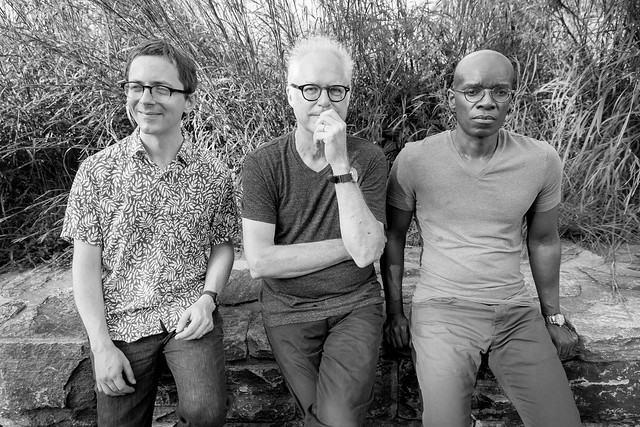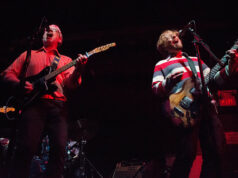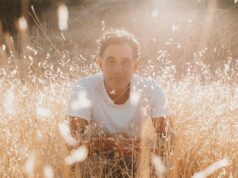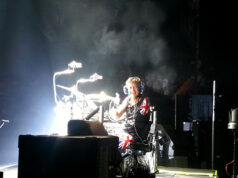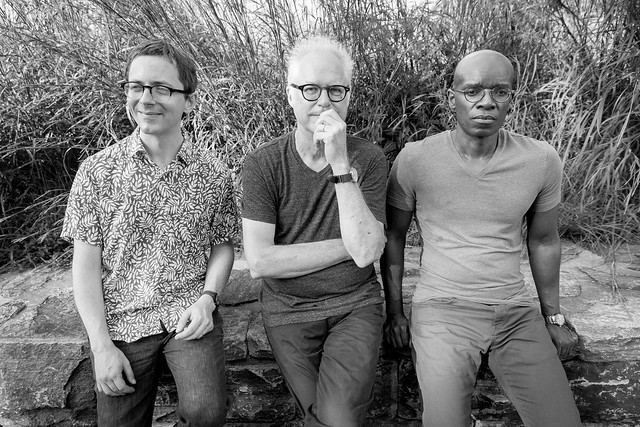
Bill Frisell Trio (Photo by Monica Jane Frisell)
Few musicians have demonstrated an eternal devotion to the exploration and discovery of sound like Bill Frisell. The 69-year-old made a name for himself as a studio guitarist for ECM Records in the 1980s and went on to become a tremendously influential presence on the New York City jazz scene working with John Zorn, Paul Motian, John Scofield, and many others on a long list of projects.
Guided by his life-long pursuit of melody, Bill left the City in 1988, intentionally breaking out of the walls of jazz he’d constructed around himself, and moved to the West Coast, but his desire to create new music would take him all over the globe.
A native of Baltimore, though he grew up in Denver, Bill’s incredible career and achievements have brought him respect worldwide as a pioneering, master guitar player, one who created his own textures and dimensions, not just in jazz, but essentially as an offering to all styles of guitar and other instruments. In the last two decades, Bill has not missed the opportunity to explore any type of sound, no matter how far off or unfamiliar the terrain, helping deteriorate a concept of “genre” that contradicts his perspective on making and writing music — something he does every day, religiously, as documented in the captivating 2017 documentary “Bill Frisell: A Portrait” by Emma Frantz.
Bill’s many collaborations and contributions made him — and still make him — one of the busiest musicians around and his willingness to work with a range of musicians has grown the reach of his influence. His staggering list of credits shines light on just how many music listeners have likely heard his inspiringly beautiful gift — he’s recorded, performed and/or written music with everyone from Ron Carter to Bonnie Raitt, from Norah Jones to William Tyler.
Stream “Valentine” by Bill Frisell on YouTube:
With what will be his second album on the Blue Note Records label, Bill Frisell is set to release Valentine on Aug. 14. A collaboration featuring familiar Bill Frisell Trio members Rudy Royston on drums and Thomas Morgan on bass, Valentine is mix of Frisell originals — some new, some with a fresh take — jazz standards, traditional songs and covers. It’s received high praise, including from DownBeat Magazine, which gave the album a 5-star, “masterpiece” rating.
Parklife DC’s Casey Vock caught up last week with Bill, who recently relocated to Brooklyn after living in Seattle for about 30 years, to talk briefly about the new album, about his earliest memories of the Charm City, and his daily hunt for new musical space and revelation.
This interview has been edited for length and focus.
Casey Vock: You were born in Baltimore, but moved to Denver early in your life. Is there any connection you have to Baltimore now other than playing there occasionally?
Bill Frisell: My memory, it’s really strong. My father is a biochemist. He went to Johns Hopkins and my mother grew up there. They met there and got married and I was born there. My whole mother’s side of the family was from there — either Baltimore or into West Virginia and all that. So I lived there, I guess it was just a few months. I was just a baby when we moved to Denver. But then, we never really went in the winter timeout, but mainly in the summer we’d travel from Denver — take the train from Denver and visit my grandparents. I’m talking about the early ’50s and ’60s. So I’m a little kid.
I remember there was a trolley car that you could take from Catonsville right into downtown Baltimore — I can’t believe that when I think about it. But I would go with my younger brother. We’d go by ourselves. I can still remember, almost, the smell of it and this little thing where you’d put the money in and it’d drop down, in this trolley car. And we’d go by ourselves into downtown Baltimore and go to the movies and stuff. And then there were these guys — these horse-drawn wagons selling — I don’t know what they were selling — fruit or something on the street. I mean it was like this whole other world. And that was when they still hadn’t pillaged all of the marble staircases on all the row houses. Visually, it really is a different city. We’d always go to Ft. McHenry and all that stuff. But just the temperature and the humidity. Then it was years before I went, and I guess I started going back many years later when I started doing gigs and traveling around. Anyways, there’s an imprint back in my whatever you call that …
CV: You played a double-header in Baltimore in March that we unfortunately had to miss.
BF: It was so cool to play Keystone Corner. It was really nice. I didn’t know what to expect. Todd Barkan, he has such a history with the music in San Francisco first and then at Lincoln Center. It was a real hopeful time for me, for what’s happening.
Watch Bill Frisell and Thomas Morgan play “Small Town” in Paste Studios in 2017:
CV: Your forthcoming album Valentine is said to be an exploration of the trio format and its freedom and a celebration of your relationship with Rudy Royston and Thomas Morgan after several years of playing together. What makes this group good at developing ideas from music?
BF: It’s pretty simple. I don’t teach much, but every once in a while, I’ll do a workshop or whatever you call it, a little class. Students will ask me questions. If someone asks me, what should I do,” it’s just basically, if you love it, that’s all it is. It will tell you all you need to know. There’s other simple things like practice and all that. But with these guys, it’s not really a secret. It’s so much about the people. So many of the people I play with, I think I get a feeling, you can almost know without hearing them play. It’s like the feeling you get. It’s about attention or listening. If you meet someone and you can tell that they’re listening to you, that’s really what it’s all about.
So with this trio, they’re my friends for one thing. And we all love what we’re doing. And we’re all just listening to each other. With music, when you’re playing a group, the main thing to do is take attention off yourself. It’s like a team, you can’t be thinking that you’re the one, it has to be about making the whole thing work, making the overall picture work. When we’re playing, the most important thing for me is to get out of my own head and put all of my attention on what’s going on around me. And when all three of us are doing that, it’s like that’s the most amazing and it’s like you enter into this other world where the music takes over and you’re not really thinking about it. You’re just in there, and you can go anywhere you want or do anything you want.
CV: Other musicians have described you as lacking an ego, as someone who lifts other musicians up, doing what’s best for the music. That’s one of the ways fellow musicians describe you. It’s a lot like in sports, where they talk about trying to be a “team person” and you mentioned team already. How did Rudy and Thomas influence this album or how would you describe the sound you guys create together?
BF: I’m not really making a joke, but to me, and I’m not trying to be modest either, but you’ve heard that thing like a group is only as strong as the weakest link. So that’s sort of my secret when I put my band together — I make sure I’m the weakest one in the band. But that’s what it feels like to me. Those guys are more like my teachers. I learn from. I look up to them. They’re always doing something that’s — with music, you’re always hoping for something, it’s a constant reaching for something that you can’t quite grasp. And those guys have that. I feel like they’re always ahead of me. They’re closer to that thing that I’m hoping for. So it’s like they’re leading the way for me or something. They just inspire me.
Sometimes it’s hard, I’m afraid to describe what it feels like. Sometimes it almost feels like magic, what’s happening, when the music is really lifting off. It’s like that thing that where you suddenly aware of it, you could break the spell and it could mess it up. This sort of relates, like with sports, but it’s the same with music. I was with my daughter, and we were playing ping-pong just for fun. I said well let’s not keep score, let’s not worry about beating each other, let’s see how many times we can hit it back and forth. We go, one, two, three, then I’m thinking, man let’s get to a hundred, before we mess up. So we start going and we keep trying and trying — 35, 36, 37, and somebody messes up, then we keep going, we keep going, and I was getting really tired, but we were just determined to get to 100. Finally we start going and we made it to 100 and it was like, 101, 102, 103, and we just got in this zone, and then it was like 200, and then 300 — it was unbelievable, just going and going. We got up to 600 — it was 608 — and then in my mind, I suddenly thought, man, I bet we can make it to a thousand, and as soon as that thought entered my mind — bam, I screwed it up, I missed it. So as soon as you start thinking, it’ll break the spell. If I try to put into words what happens, it somehow takes it away from what’s really happening.

Bill Frisell (center) with Thomas Morgan and Rudy Royston (Photo by Monica Jane Frisell)
CV: Jim Hall, a mentor of yours, said that you have an ability to draw other musicians out into a place where they can find himself or herself. You’ve been referred to as “playing from the middle,” which is what Jim was said to do. As someone who has a clear pattern of refreshing himself from project to project, seemingly always in search of a new place of improvisation or essentially new territory that could make you a beginner, how do you influence or encourage others to do the same?
BF: It’s not something that I would put on someone. I think that’s why I also choose to play the people I play with, because they have that same curiosity. Like I said that thing about always reaching. But it’s just a natural thing with music. I’m always surprised at the question when someone says well how do you decide what to do next? Because it’s within the music. Even if you just play one note, within that one note is a question. It’s like you play the note and then the note is asking, ok, what are you going to play next? Or if you play a whole song, it makes you want to learn another song, you want to know where that song came from and it will lead you to finding another song. It never leaves with you with nothing to look towards.
So what I’m saying is that’s not something I tell the other guys to do, they have that already, and that’s just part of the deal with music. When I was really young, I used to think that you practice real hard and you get to this point where everything’s all figured out and you’re just really good or something. After a point you realize, ‘wait a minute, this is never gonna end,’ you’re never gonna figure it out. Whatever you do, there’s always something else that’s out there that you haven’t gotten to yet, whether you’re Beethoven or anybody. It just never stops. I had to figure that out and then get comfortable with the fact that I was never gonna get the whole thing …
Every day you wake up and it feels like you’re at the beginning. It doesn’t really feel that different from when I first picked up the guitar, it’s infinite, what’s in front of you that you haven’t done. That’s always there. So just keep on plugging away.
Watch the official music video for “We Shall Overcome” by Bill Frisell on YouTube:
CV: The video for We Shall Overcome has artwork created by your daughter, and you’re connected to artists from various realms. You’ve made the comparison between art, writing, and music as similar from a creative perspective. Can you talk about the place that art has in your life or its importance to you?
BF: Art and drawing and painting and writing, I think it all comes from the same place. When I was a little kid, I used to draw a lot — rocket ships or hotrods or whatever. As I get older, I realize how that’s so connected. I can feel the connection when I’m trying to make music. That’s another thing — trying to stay connected to my child in me. I think that’s really important. That’s where all the good stuff is, I think. I just feel like all that stuff is not really separate, it comes from the same source in human beings.
**
Bill’s new album will be released on Aug. 14. You can order a copy of it via his website and listen to the singles released so far on Spotify and other streaming platforms.
To order the album and get more music, visit Bill Frisell’s website!
